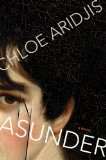Reading Guide Questions

Please be aware that this discussion guide will contain spoilers!
Discussion Questions for Asunder by Chloe Aridjis
- Early in the novel Marie concedes that her position as guard is actually suited to those afflicted by acedia, a state of torpor in which a person no longer cares about her position or condition in the world. She claims to be free of the ailment, stating (on page 2):
"...I do not suffer from boredom or listlessness." Yet we rarely see her act - at least in the beginning of the novel - and her primary interest seems to be inaction or immobility in one form or another. Do you agree with Marie that she does not suffer from acedia?
- One could say that Marie is defined by her inaction. As a museum guard, she considers intervening several times (on pages 65 and 68, forexample) but stays still. She never voices her opinion of Daniel's poetry to him, and her response to his timid advance in Paris is to remain silent. Do you see a change in this aspect of her character as the novel progresses?
- The story of Mary Richardson's attack on Velázquez's Venus seems to haunt Marie nearly as much as it did her great-grandfather Ted. But she hints (on page 30) that her loyalties are divided: "I loved him just a tiny bit more for not having reached her in time." What do you think the appeal of such an attack might be to someone who respects great works of art as much as Marie does?
- Richardson herself claimed that her attack on the Rokeby Venus was in protest of the recent imprisonment of the prominent suffragette Emmeline Pankhurst, who was, she claimed, "the most beautiful character in modern history." Do you think the attack was purely an act of vandalism? If not, what kind of message do you think Richardson sent with her protest?
- Marie is fascinated when she first learns about the phenomenon of craquelure (on pages 60-62), the network of cracks that develop through "release of stress" in an old oil painting. Almost immediately after hearing the art historian describe this process, she begins to notice "small changes in mood" and finds it increasingly difficult to exert her self -control. What other examples of craquelure do you observe in Marie?
- How does this concept of craquelure as a metaphor contrast with the violent slashes that Mary Richardson left in the Rokeby Venus? Do you see a metaphor for any part of Marie's life in those slashes?
- Decay and decomposition are ever-present themes in this novel. Craquelure is a form of slow decomposition, of course, and Marie tracks the decay of moths in her miniature landscapes with avid interest. Whens he finally destroys the landscapes, Marie takes particular satisfaction in "the yielding of the eggshells," which crumble away to dust. Are there other images of decay or decomposition that stand out to you? How are they significant in the novel's development?
- As Marie destroys the landscapes that have been her hobby and
"collection" for so long, she says, "The more I thought back on the
chatelain the greater my contempt for these misshapen things" (page 183). Why do you think that is?
Free from http://www.scribd.com/doc/165213940/Asunder-A-Novel-by-Chloe-Aridjis-Discussion-Questions
Unless otherwise stated, this discussion guide is reprinted with the permission of Mariner Books.
Any page references refer to a USA edition of the book, usually the trade paperback version, and may vary in other editions.

 Book Reviewed by:
Book Reviewed by:


